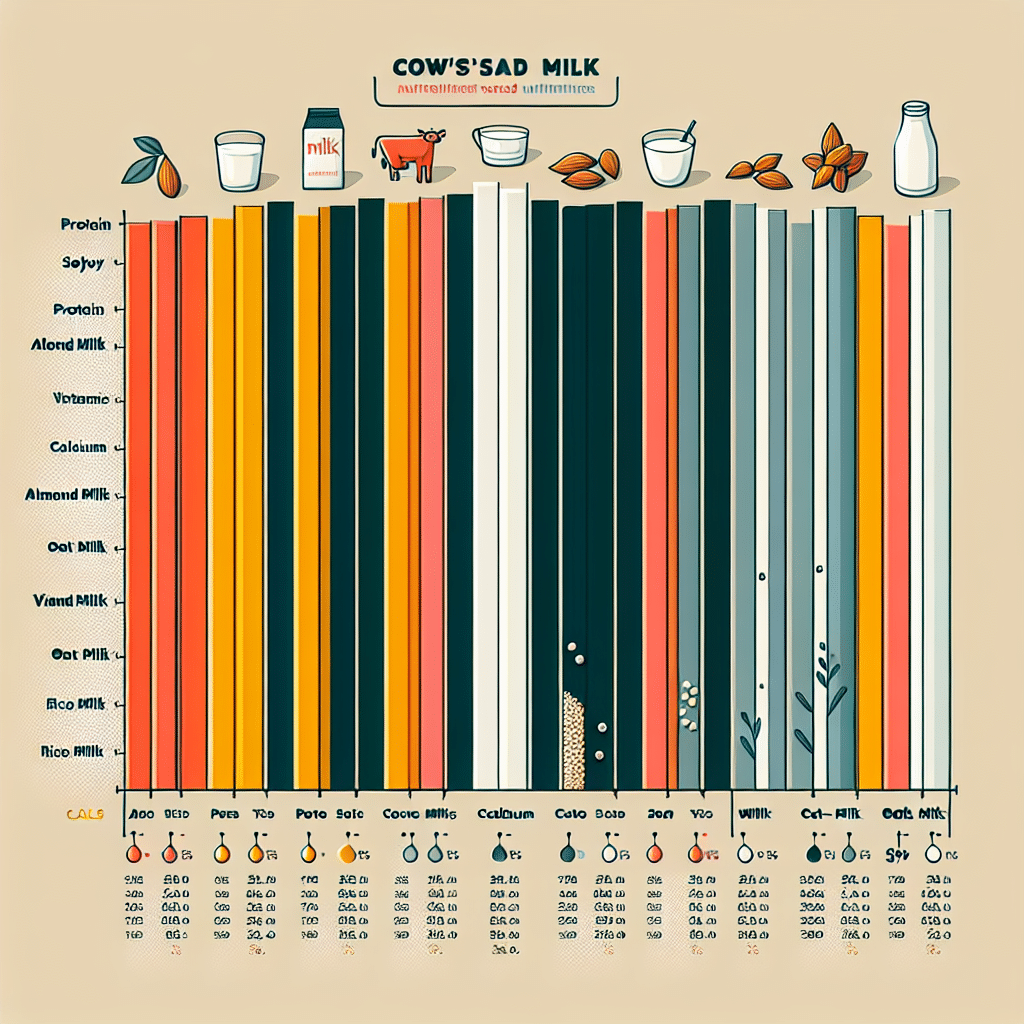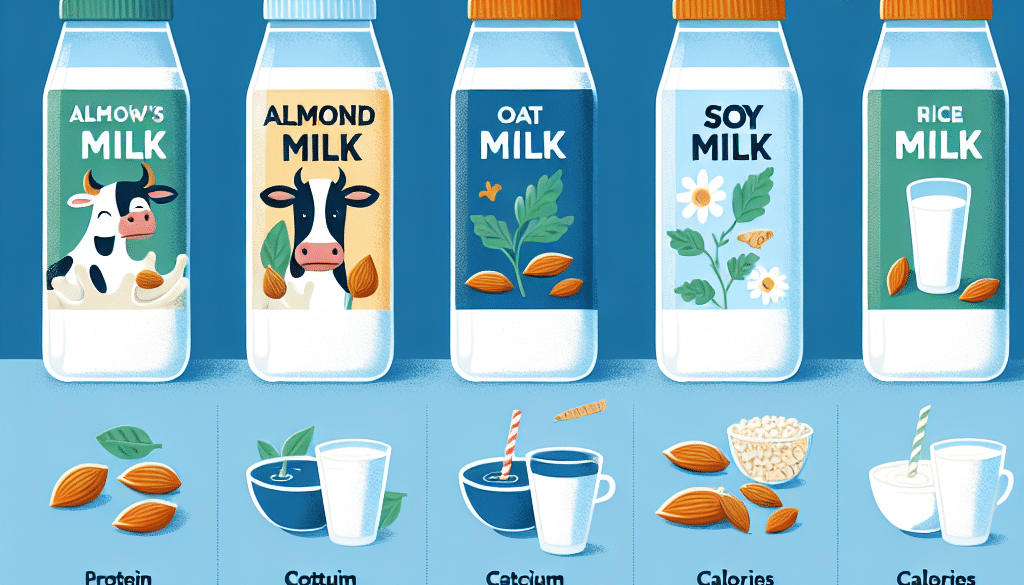Comparing Nutrition of Cow’s Milk to Plant-Based Alternatives
-
Table of Contents
- Comparing Nutrition of Cow’s Milk to Plant-Based Alternatives
- Nutritional Profile of Cow’s Milk
- Plant-Based Milk Alternatives
- Comparative Analysis of Nutrients
- Protein Content
- Calcium and Vitamin D
- Vitamins and Minerals
- Fat Content
- Sugar Content
- Environmental and Ethical Considerations
- Case Studies and Statistics
- Conclusion: Key Takeaways
- ETprotein’s Protein Products Recommendation
Comparing Nutrition of Cow’s Milk to Plant-Based Alternatives

As consumers become more health-conscious and environmentally aware, the demand for plant-based milk alternatives has surged. These alternatives are often sought by those with lactose intolerance, dairy allergies, ethical concerns, or a desire for a lower environmental footprint. This article delves into the nutritional comparison between cow’s milk and its plant-based counterparts, examining the benefits and considerations of each.
Nutritional Profile of Cow’s Milk
Cow’s milk has been a staple in many diets around the world for centuries. It is well-known for its rich content of essential nutrients, including:
- Calcium: Vital for bone health and muscle function.
- Protein: Necessary for muscle repair and growth.
- Vitamin D: Important for calcium absorption and immune function.
- Vitamin B12: Crucial for nerve function and blood cell formation.
- Potassium: Helps regulate blood pressure and fluid balance.
However, cow’s milk also contains saturated fats and cholesterol, which some individuals may need to monitor for health reasons.
Plant-Based Milk Alternatives
Plant-based milk alternatives are derived from various sources, including nuts, grains, and legumes. The most popular varieties include:
- Almond milk
- Soy milk
- Oat milk
- Rice milk
- Coconut milk
- Hemp milk
- Pea milk
Each type of plant-based milk has a unique nutritional profile, which can vary significantly from cow’s milk and from each other.
Comparative Analysis of Nutrients
Protein Content
Cow’s milk is known for its high protein content, with about 8 grams per cup. Soy and pea milk come closest to this, offering 7-8 grams per cup, making them suitable for those looking to maintain protein intake. Other plant-based milks, such as almond, rice, and coconut milk, typically offer less protein, sometimes as little as 1 gram per cup.
Calcium and Vitamin D
While cow’s milk is naturally high in calcium and often fortified with vitamin D, plant-based milks are usually fortified to match these levels. It’s important to check the labels, as the amount of fortification can vary between brands and types.
Vitamins and Minerals
Many plant-based milks are enriched with B vitamins, including B12, which is naturally found in cow’s milk. However, the bioavailability of these nutrients may differ. For example, the calcium in fortified plant milks may not be as easily absorbed by the body as the calcium in cow’s milk.
Fat Content
Most plant-based milks have lower saturated fat content compared to cow’s milk, which can be beneficial for heart health. However, some, like coconut milk, can be high in saturated fats, so it’s essential to read the nutritional information.
Sugar Content
Unsweetened plant-based milks generally have lower sugar content than cow’s milk, which contains lactose. However, flavored or sweetened versions can contain added sugars, so choosing unsweetened varieties is advisable for those monitoring sugar intake.
Environmental and Ethical Considerations
Plant-based milks typically have a lower environmental impact than cow’s milk, requiring less water and land and producing fewer greenhouse gases. Ethically, they offer an alternative for those who wish to avoid animal products due to concerns about animal welfare or the use of antibiotics and hormones in dairy farming.
Case Studies and Statistics
According to a study published in the Journal of Food Science and Technology, soy milk is the most balanced nutritional alternative to cow’s milk. Another study by the University of Oxford found that producing a glass of dairy milk results in almost three times more greenhouse gas emissions than any plant-based milk. Statistics show that the global plant-based milk market is expected to reach $21.52 billion by 2024, reflecting the growing consumer shift towards these alternatives.
Conclusion: Key Takeaways
In summary, while cow’s milk is a rich source of various nutrients, plant-based alternatives can provide comparable nutritional benefits when chosen wisely. Consumers should consider their dietary needs, read labels for fortification levels, and opt for unsweetened versions to avoid added sugars. With a range of options available, there is a plant-based milk to suit most preferences and nutritional requirements.
ETprotein’s Protein Products Recommendation
For those seeking high-quality plant-based protein options, ETprotein offers a range of organic bulk vegan proteins that cater to various dietary needs. Their products, including rice protein, pea protein, and seed-based proteins, are non-GMO, allergen-free, and feature high purity levels. These proteins are ideal for anyone looking to supplement their diet with plant-based nutrients, whether for health, ethical, or environmental reasons.
About ETprotein:
ETprotein, a reputable protein and L-(+)-Ergothioneine (EGT) Chinese factory manufacturer and supplier, is renowned for producing, stocking, exporting, and delivering the highest quality organic bulk vegan proteins and L-(+)-Ergothioneine. They include Organic rice protein, clear rice protein, pea protein, clear pea protein, watermelon seed protein, pumpkin seed protein, sunflower seed protein, mung bean protein, peanut protein, and L-(+)-Ergothioneine EGT Pharmaceutical grade, L-(+)-Ergothioneine EGT food grade, L-(+)-Ergothioneine EGT cosmetic grade, L-(+)-Ergothioneine EGT reference grade and L-(+)-Ergothioneine EGT standard. Their offerings, characterized by a neutral taste, non-GMO, allergen-free attributes, with L-(+)-Ergothioneine purity over 98%, 99%, cater to a diverse range of industries. They serve nutraceutical, pharmaceutical, cosmeceutical, veterinary, as well as food and beverage finished product distributors, traders, and manufacturers across Europe, USA, Canada, Australia, Thailand, Japan, Korea, Brazil, and Chile, among others.
ETprotein specialization includes exporting and delivering tailor-made protein powder and finished nutritional supplements. Their extensive product range covers sectors like Food and Beverage, Sports Nutrition, Weight Management, Dietary Supplements, Health and Wellness Products, and Infant Formula, ensuring comprehensive solutions to meet all your protein needs.
As a trusted company by leading global food and beverage brands and Fortune 500 companies, ETprotein reinforces China’s reputation in the global arena. For more information or to sample their products, please contact them and email sales(at)ETprotein.com today.












